M05 Insurance Law Coursework Assignment Answer Template - 2019
VerifiedAdded on 2023/01/13
|22
|5961
|440
Homework Assignment
AI Summary
This coursework assignment solution addresses several key areas within insurance law, providing detailed answers to five questions. The first question examines private nuisance, defining the tort and its relevance to a case study involving a new resident. The second question focuses on contract law, specifically the breach of contract in relation to an insurance policy cancellation due to non-payment. The third question explores agency law, including the delegation of responsibilities by agents and the termination of underwriting authority contracts. The fourth question delves into life insurance, discussing insurable interest, consent, and misrepresentation in the context of a case study. The fifth question covers motor insurance, including the Road Traffic Act 1988 and the implications of policy breaches. The assignment incorporates relevant case law and legal principles to provide a thorough understanding of insurance law concepts.
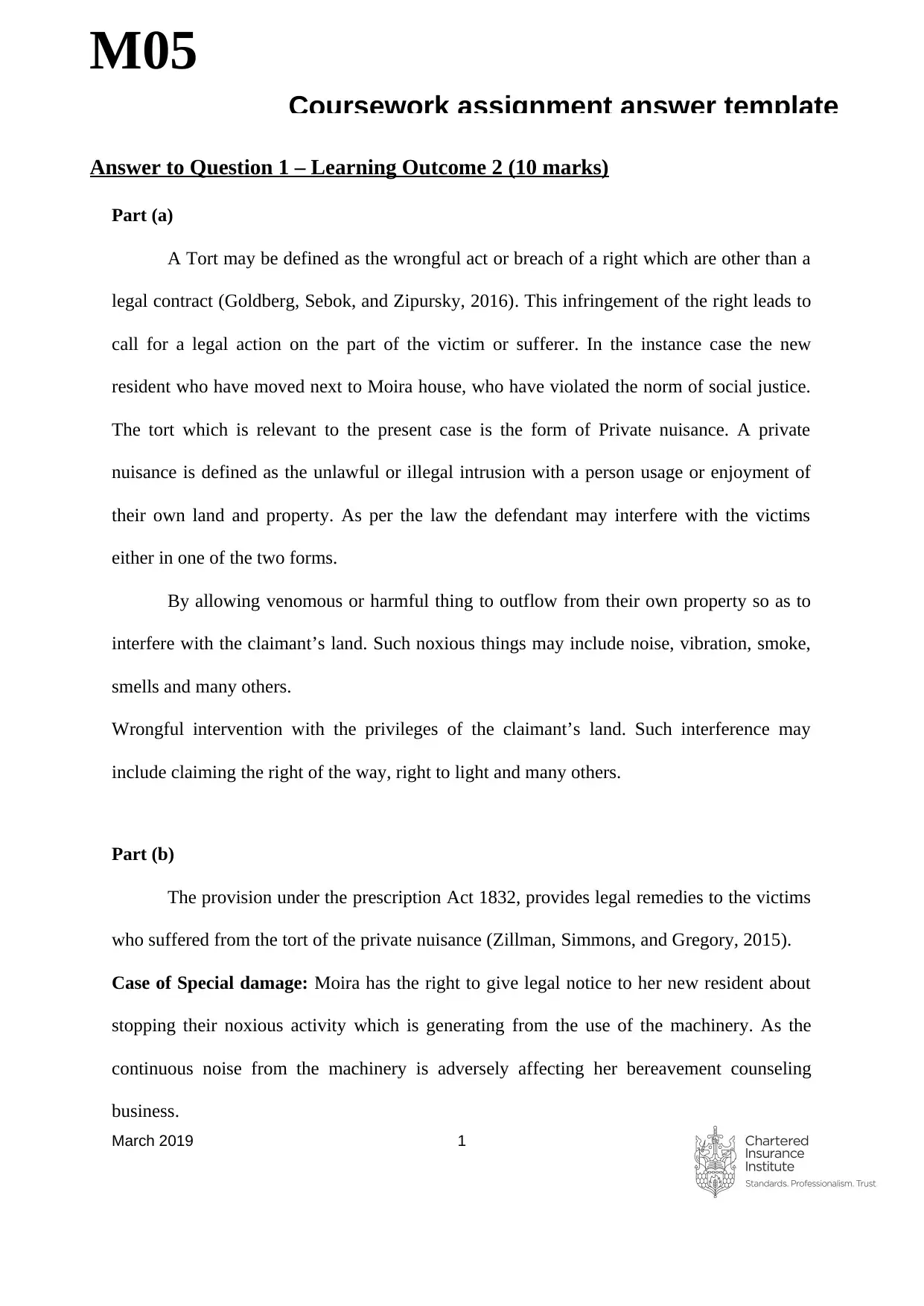
M05
wAssi
Coursework assignment answer template
Answer to Question 1 – Learning Outcome 2 (10 marks)
Part (a)
A Tort may be defined as the wrongful act or breach of a right which are other than a
legal contract (Goldberg, Sebok, and Zipursky, 2016). This infringement of the right leads to
call for a legal action on the part of the victim or sufferer. In the instance case the new
resident who have moved next to Moira house, who have violated the norm of social justice.
The tort which is relevant to the present case is the form of Private nuisance. A private
nuisance is defined as the unlawful or illegal intrusion with a person usage or enjoyment of
their own land and property. As per the law the defendant may interfere with the victims
either in one of the two forms.
By allowing venomous or harmful thing to outflow from their own property so as to
interfere with the claimant’s land. Such noxious things may include noise, vibration, smoke,
smells and many others.
Wrongful intervention with the privileges of the claimant’s land. Such interference may
include claiming the right of the way, right to light and many others.
Part (b)
The provision under the prescription Act 1832, provides legal remedies to the victims
who suffered from the tort of the private nuisance (Zillman, Simmons, and Gregory, 2015).
Case of Special damage: Moira has the right to give legal notice to her new resident about
stopping their noxious activity which is generating from the use of the machinery. As the
continuous noise from the machinery is adversely affecting her bereavement counseling
business.
March 2019 1
wAssi
Coursework assignment answer template
Answer to Question 1 – Learning Outcome 2 (10 marks)
Part (a)
A Tort may be defined as the wrongful act or breach of a right which are other than a
legal contract (Goldberg, Sebok, and Zipursky, 2016). This infringement of the right leads to
call for a legal action on the part of the victim or sufferer. In the instance case the new
resident who have moved next to Moira house, who have violated the norm of social justice.
The tort which is relevant to the present case is the form of Private nuisance. A private
nuisance is defined as the unlawful or illegal intrusion with a person usage or enjoyment of
their own land and property. As per the law the defendant may interfere with the victims
either in one of the two forms.
By allowing venomous or harmful thing to outflow from their own property so as to
interfere with the claimant’s land. Such noxious things may include noise, vibration, smoke,
smells and many others.
Wrongful intervention with the privileges of the claimant’s land. Such interference may
include claiming the right of the way, right to light and many others.
Part (b)
The provision under the prescription Act 1832, provides legal remedies to the victims
who suffered from the tort of the private nuisance (Zillman, Simmons, and Gregory, 2015).
Case of Special damage: Moira has the right to give legal notice to her new resident about
stopping their noxious activity which is generating from the use of the machinery. As the
continuous noise from the machinery is adversely affecting her bereavement counseling
business.
March 2019 1
Paraphrase This Document
Need a fresh take? Get an instant paraphrase of this document with our AI Paraphraser
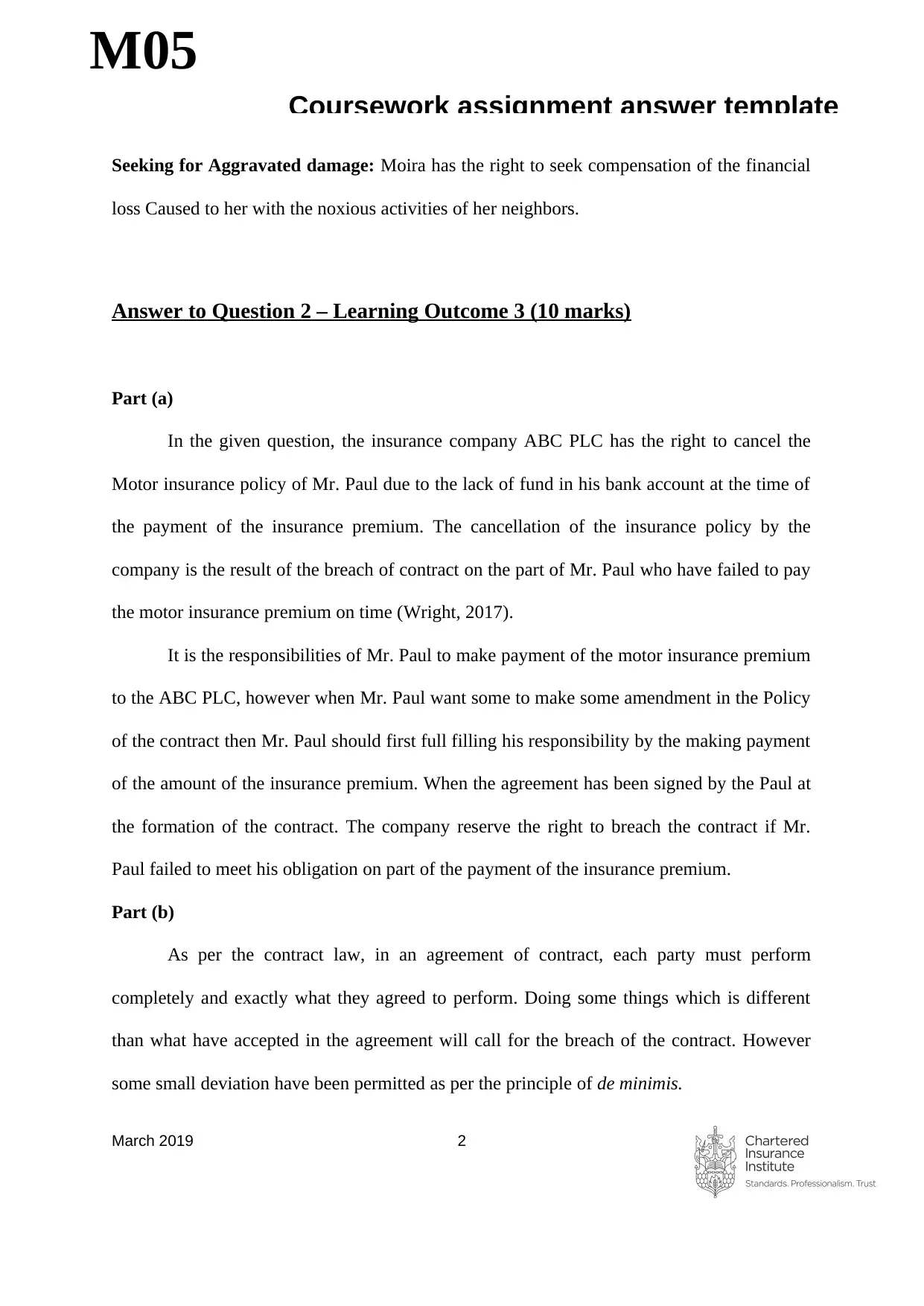
Coursework assignment answer template
M05
wAssiSeeking for Aggravated damage: Moira has the right to seek compensation of the financial
loss Caused to her with the noxious activities of her neighbors.
Answer to Question 2 – Learning Outcome 3 (10 marks)
Part (a)
In the given question, the insurance company ABC PLC has the right to cancel the
Motor insurance policy of Mr. Paul due to the lack of fund in his bank account at the time of
the payment of the insurance premium. The cancellation of the insurance policy by the
company is the result of the breach of contract on the part of Mr. Paul who have failed to pay
the motor insurance premium on time (Wright, 2017).
It is the responsibilities of Mr. Paul to make payment of the motor insurance premium
to the ABC PLC, however when Mr. Paul want some to make some amendment in the Policy
of the contract then Mr. Paul should first full filling his responsibility by the making payment
of the amount of the insurance premium. When the agreement has been signed by the Paul at
the formation of the contract. The company reserve the right to breach the contract if Mr.
Paul failed to meet his obligation on part of the payment of the insurance premium.
Part (b)
As per the contract law, in an agreement of contract, each party must perform
completely and exactly what they agreed to perform. Doing some things which is different
than what have accepted in the agreement will call for the breach of the contract. However
some small deviation have been permitted as per the principle of de minimis.
March 2019 2
M05
wAssiSeeking for Aggravated damage: Moira has the right to seek compensation of the financial
loss Caused to her with the noxious activities of her neighbors.
Answer to Question 2 – Learning Outcome 3 (10 marks)
Part (a)
In the given question, the insurance company ABC PLC has the right to cancel the
Motor insurance policy of Mr. Paul due to the lack of fund in his bank account at the time of
the payment of the insurance premium. The cancellation of the insurance policy by the
company is the result of the breach of contract on the part of Mr. Paul who have failed to pay
the motor insurance premium on time (Wright, 2017).
It is the responsibilities of Mr. Paul to make payment of the motor insurance premium
to the ABC PLC, however when Mr. Paul want some to make some amendment in the Policy
of the contract then Mr. Paul should first full filling his responsibility by the making payment
of the amount of the insurance premium. When the agreement has been signed by the Paul at
the formation of the contract. The company reserve the right to breach the contract if Mr.
Paul failed to meet his obligation on part of the payment of the insurance premium.
Part (b)
As per the contract law, in an agreement of contract, each party must perform
completely and exactly what they agreed to perform. Doing some things which is different
than what have accepted in the agreement will call for the breach of the contract. However
some small deviation have been permitted as per the principle of de minimis.
March 2019 2

Coursework assignment answer template
M05
wAssiBut in the given case, Mr. Paul has the obligation to pay his motor premium every month
specifically from his bank account, and Mr. Paul wanted to do some modification in the
contract. The company has cancelled his insurance car motor policy, due the lack of fund in
his bank account. This action of the company is aptly suited in the circumstances and cannot
be challenged.
Answer to Question 3 – Learning Outcome 4 (10 marks)
In general an agent has no right to delegates his responsibilities to the sub- agent.
However, delegation of responsibilities may be allowed in certain circumstances which are
mentioned below (Best, Barnes, and Kahn-Fogel, 2018).
Where the principal specifically empowers the agent to delegate the all or some of the
responsibilities.
Where the necessity of the delegation of the responsibility can be inferred from the
circumstances- such as the delegation of the routine accountability and managerial
task of the workforces.
Where the delegation of the responsibility is in agreement with trade or the custom.
The delegation can be allowed in the case of the specific necessity.
When the responsibility has been delegated, this means that sub-broker will now act on
behalf of the agent and not on the principle. As a result of this, now the agent will be held
accountable to the principle for the work of the sub-agent and the agent will be liable to pay
the sub- agent.
March 2019 3
M05
wAssiBut in the given case, Mr. Paul has the obligation to pay his motor premium every month
specifically from his bank account, and Mr. Paul wanted to do some modification in the
contract. The company has cancelled his insurance car motor policy, due the lack of fund in
his bank account. This action of the company is aptly suited in the circumstances and cannot
be challenged.
Answer to Question 3 – Learning Outcome 4 (10 marks)
In general an agent has no right to delegates his responsibilities to the sub- agent.
However, delegation of responsibilities may be allowed in certain circumstances which are
mentioned below (Best, Barnes, and Kahn-Fogel, 2018).
Where the principal specifically empowers the agent to delegate the all or some of the
responsibilities.
Where the necessity of the delegation of the responsibility can be inferred from the
circumstances- such as the delegation of the routine accountability and managerial
task of the workforces.
Where the delegation of the responsibility is in agreement with trade or the custom.
The delegation can be allowed in the case of the specific necessity.
When the responsibility has been delegated, this means that sub-broker will now act on
behalf of the agent and not on the principle. As a result of this, now the agent will be held
accountable to the principle for the work of the sub-agent and the agent will be liable to pay
the sub- agent.
March 2019 3
⊘ This is a preview!⊘
Do you want full access?
Subscribe today to unlock all pages.

Trusted by 1+ million students worldwide
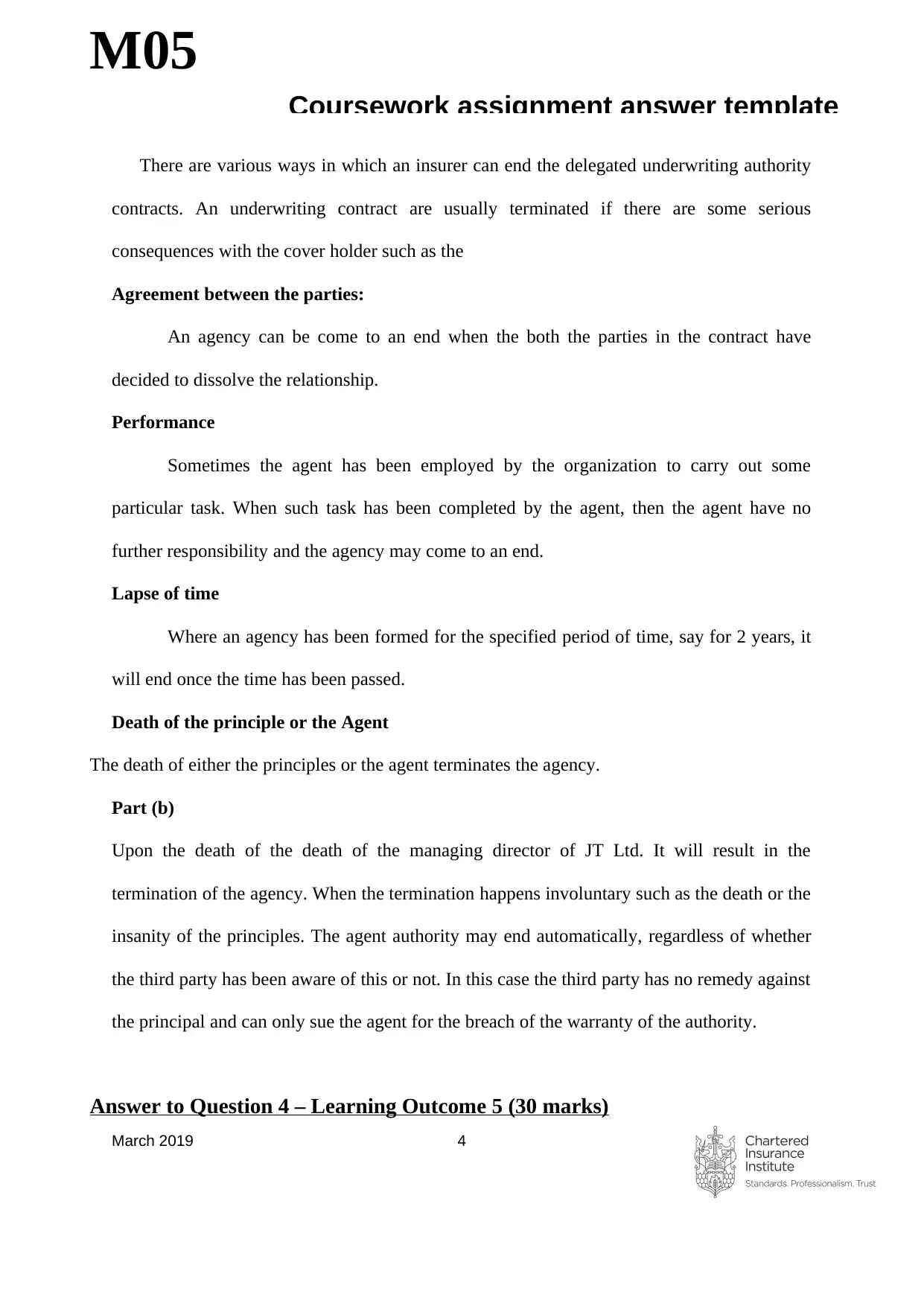
Coursework assignment answer template
M05
wAssiThere are various ways in which an insurer can end the delegated underwriting authority
contracts. An underwriting contract are usually terminated if there are some serious
consequences with the cover holder such as the
Agreement between the parties:
An agency can be come to an end when the both the parties in the contract have
decided to dissolve the relationship.
Performance
Sometimes the agent has been employed by the organization to carry out some
particular task. When such task has been completed by the agent, then the agent have no
further responsibility and the agency may come to an end.
Lapse of time
Where an agency has been formed for the specified period of time, say for 2 years, it
will end once the time has been passed.
Death of the principle or the Agent
The death of either the principles or the agent terminates the agency.
Part (b)
Upon the death of the death of the managing director of JT Ltd. It will result in the
termination of the agency. When the termination happens involuntary such as the death or the
insanity of the principles. The agent authority may end automatically, regardless of whether
the third party has been aware of this or not. In this case the third party has no remedy against
the principal and can only sue the agent for the breach of the warranty of the authority.
Answer to Question 4 – Learning Outcome 5 (30 marks)
March 2019 4
M05
wAssiThere are various ways in which an insurer can end the delegated underwriting authority
contracts. An underwriting contract are usually terminated if there are some serious
consequences with the cover holder such as the
Agreement between the parties:
An agency can be come to an end when the both the parties in the contract have
decided to dissolve the relationship.
Performance
Sometimes the agent has been employed by the organization to carry out some
particular task. When such task has been completed by the agent, then the agent have no
further responsibility and the agency may come to an end.
Lapse of time
Where an agency has been formed for the specified period of time, say for 2 years, it
will end once the time has been passed.
Death of the principle or the Agent
The death of either the principles or the agent terminates the agency.
Part (b)
Upon the death of the death of the managing director of JT Ltd. It will result in the
termination of the agency. When the termination happens involuntary such as the death or the
insanity of the principles. The agent authority may end automatically, regardless of whether
the third party has been aware of this or not. In this case the third party has no remedy against
the principal and can only sue the agent for the breach of the warranty of the authority.
Answer to Question 4 – Learning Outcome 5 (30 marks)
March 2019 4
Paraphrase This Document
Need a fresh take? Get an instant paraphrase of this document with our AI Paraphraser
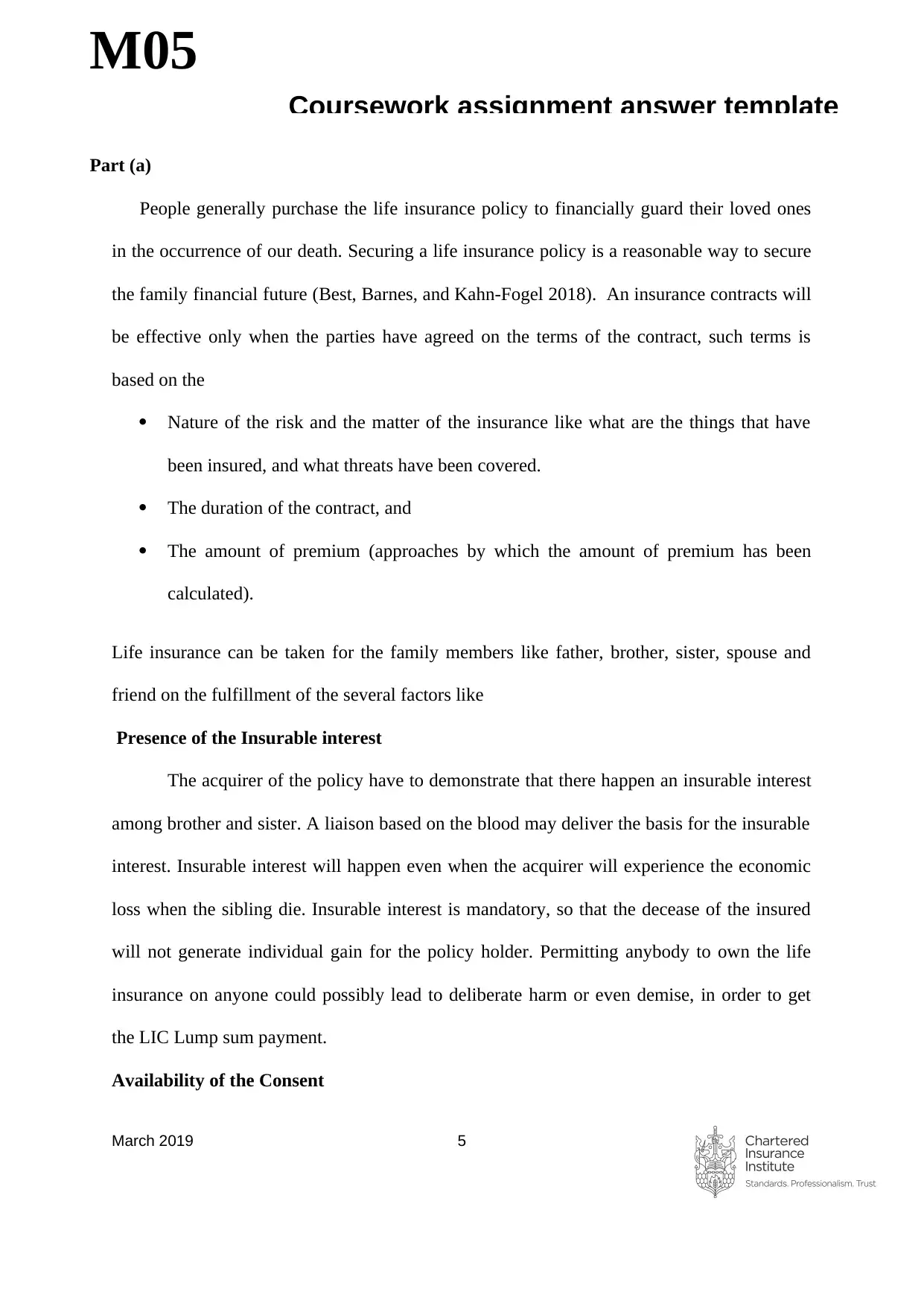
Coursework assignment answer template
M05
wAssiPart (a)
People generally purchase the life insurance policy to financially guard their loved ones
in the occurrence of our death. Securing a life insurance policy is a reasonable way to secure
the family financial future (Best, Barnes, and Kahn-Fogel 2018). An insurance contracts will
be effective only when the parties have agreed on the terms of the contract, such terms is
based on the
Nature of the risk and the matter of the insurance like what are the things that have
been insured, and what threats have been covered.
The duration of the contract, and
The amount of premium (approaches by which the amount of premium has been
calculated).
Life insurance can be taken for the family members like father, brother, sister, spouse and
friend on the fulfillment of the several factors like
Presence of the Insurable interest
The acquirer of the policy have to demonstrate that there happen an insurable interest
among brother and sister. A liaison based on the blood may deliver the basis for the insurable
interest. Insurable interest will happen even when the acquirer will experience the economic
loss when the sibling die. Insurable interest is mandatory, so that the decease of the insured
will not generate individual gain for the policy holder. Permitting anybody to own the life
insurance on anyone could possibly lead to deliberate harm or even demise, in order to get
the LIC Lump sum payment.
Availability of the Consent
March 2019 5
M05
wAssiPart (a)
People generally purchase the life insurance policy to financially guard their loved ones
in the occurrence of our death. Securing a life insurance policy is a reasonable way to secure
the family financial future (Best, Barnes, and Kahn-Fogel 2018). An insurance contracts will
be effective only when the parties have agreed on the terms of the contract, such terms is
based on the
Nature of the risk and the matter of the insurance like what are the things that have
been insured, and what threats have been covered.
The duration of the contract, and
The amount of premium (approaches by which the amount of premium has been
calculated).
Life insurance can be taken for the family members like father, brother, sister, spouse and
friend on the fulfillment of the several factors like
Presence of the Insurable interest
The acquirer of the policy have to demonstrate that there happen an insurable interest
among brother and sister. A liaison based on the blood may deliver the basis for the insurable
interest. Insurable interest will happen even when the acquirer will experience the economic
loss when the sibling die. Insurable interest is mandatory, so that the decease of the insured
will not generate individual gain for the policy holder. Permitting anybody to own the life
insurance on anyone could possibly lead to deliberate harm or even demise, in order to get
the LIC Lump sum payment.
Availability of the Consent
March 2019 5
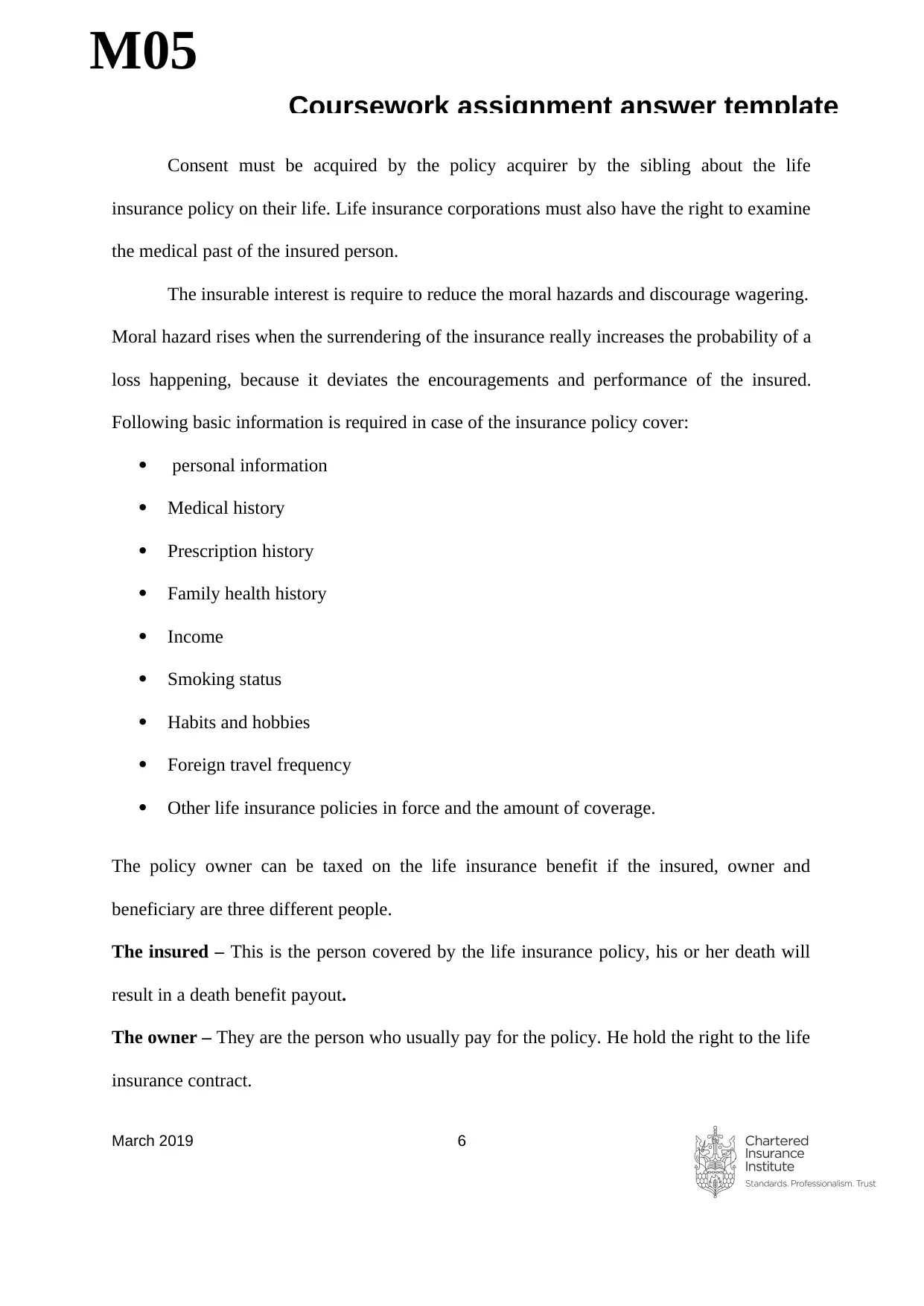
Coursework assignment answer template
M05
wAssiConsent must be acquired by the policy acquirer by the sibling about the life
insurance policy on their life. Life insurance corporations must also have the right to examine
the medical past of the insured person.
The insurable interest is require to reduce the moral hazards and discourage wagering.
Moral hazard rises when the surrendering of the insurance really increases the probability of a
loss happening, because it deviates the encouragements and performance of the insured.
Following basic information is required in case of the insurance policy cover:
personal information
Medical history
Prescription history
Family health history
Income
Smoking status
Habits and hobbies
Foreign travel frequency
Other life insurance policies in force and the amount of coverage.
The policy owner can be taxed on the life insurance benefit if the insured, owner and
beneficiary are three different people.
The insured – This is the person covered by the life insurance policy, his or her death will
result in a death benefit payout.
The owner – They are the person who usually pay for the policy. He hold the right to the life
insurance contract.
March 2019 6
M05
wAssiConsent must be acquired by the policy acquirer by the sibling about the life
insurance policy on their life. Life insurance corporations must also have the right to examine
the medical past of the insured person.
The insurable interest is require to reduce the moral hazards and discourage wagering.
Moral hazard rises when the surrendering of the insurance really increases the probability of a
loss happening, because it deviates the encouragements and performance of the insured.
Following basic information is required in case of the insurance policy cover:
personal information
Medical history
Prescription history
Family health history
Income
Smoking status
Habits and hobbies
Foreign travel frequency
Other life insurance policies in force and the amount of coverage.
The policy owner can be taxed on the life insurance benefit if the insured, owner and
beneficiary are three different people.
The insured – This is the person covered by the life insurance policy, his or her death will
result in a death benefit payout.
The owner – They are the person who usually pay for the policy. He hold the right to the life
insurance contract.
March 2019 6
⊘ This is a preview!⊘
Do you want full access?
Subscribe today to unlock all pages.

Trusted by 1+ million students worldwide
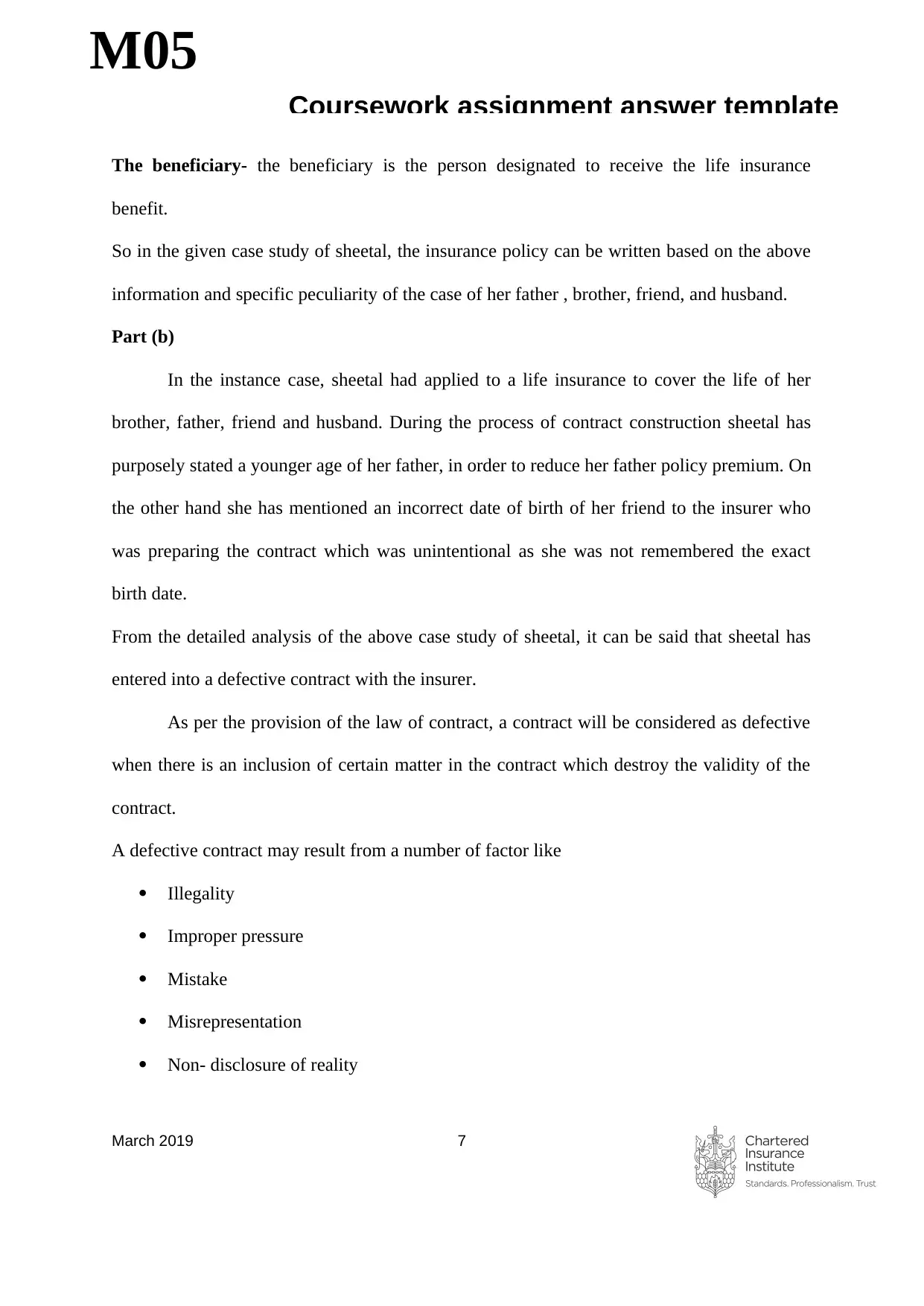
Coursework assignment answer template
M05
wAssiThe beneficiary- the beneficiary is the person designated to receive the life insurance
benefit.
So in the given case study of sheetal, the insurance policy can be written based on the above
information and specific peculiarity of the case of her father , brother, friend, and husband.
Part (b)
In the instance case, sheetal had applied to a life insurance to cover the life of her
brother, father, friend and husband. During the process of contract construction sheetal has
purposely stated a younger age of her father, in order to reduce her father policy premium. On
the other hand she has mentioned an incorrect date of birth of her friend to the insurer who
was preparing the contract which was unintentional as she was not remembered the exact
birth date.
From the detailed analysis of the above case study of sheetal, it can be said that sheetal has
entered into a defective contract with the insurer.
As per the provision of the law of contract, a contract will be considered as defective
when there is an inclusion of certain matter in the contract which destroy the validity of the
contract.
A defective contract may result from a number of factor like
Illegality
Improper pressure
Mistake
Misrepresentation
Non- disclosure of reality
March 2019 7
M05
wAssiThe beneficiary- the beneficiary is the person designated to receive the life insurance
benefit.
So in the given case study of sheetal, the insurance policy can be written based on the above
information and specific peculiarity of the case of her father , brother, friend, and husband.
Part (b)
In the instance case, sheetal had applied to a life insurance to cover the life of her
brother, father, friend and husband. During the process of contract construction sheetal has
purposely stated a younger age of her father, in order to reduce her father policy premium. On
the other hand she has mentioned an incorrect date of birth of her friend to the insurer who
was preparing the contract which was unintentional as she was not remembered the exact
birth date.
From the detailed analysis of the above case study of sheetal, it can be said that sheetal has
entered into a defective contract with the insurer.
As per the provision of the law of contract, a contract will be considered as defective
when there is an inclusion of certain matter in the contract which destroy the validity of the
contract.
A defective contract may result from a number of factor like
Illegality
Improper pressure
Mistake
Misrepresentation
Non- disclosure of reality
March 2019 7
Paraphrase This Document
Need a fresh take? Get an instant paraphrase of this document with our AI Paraphraser
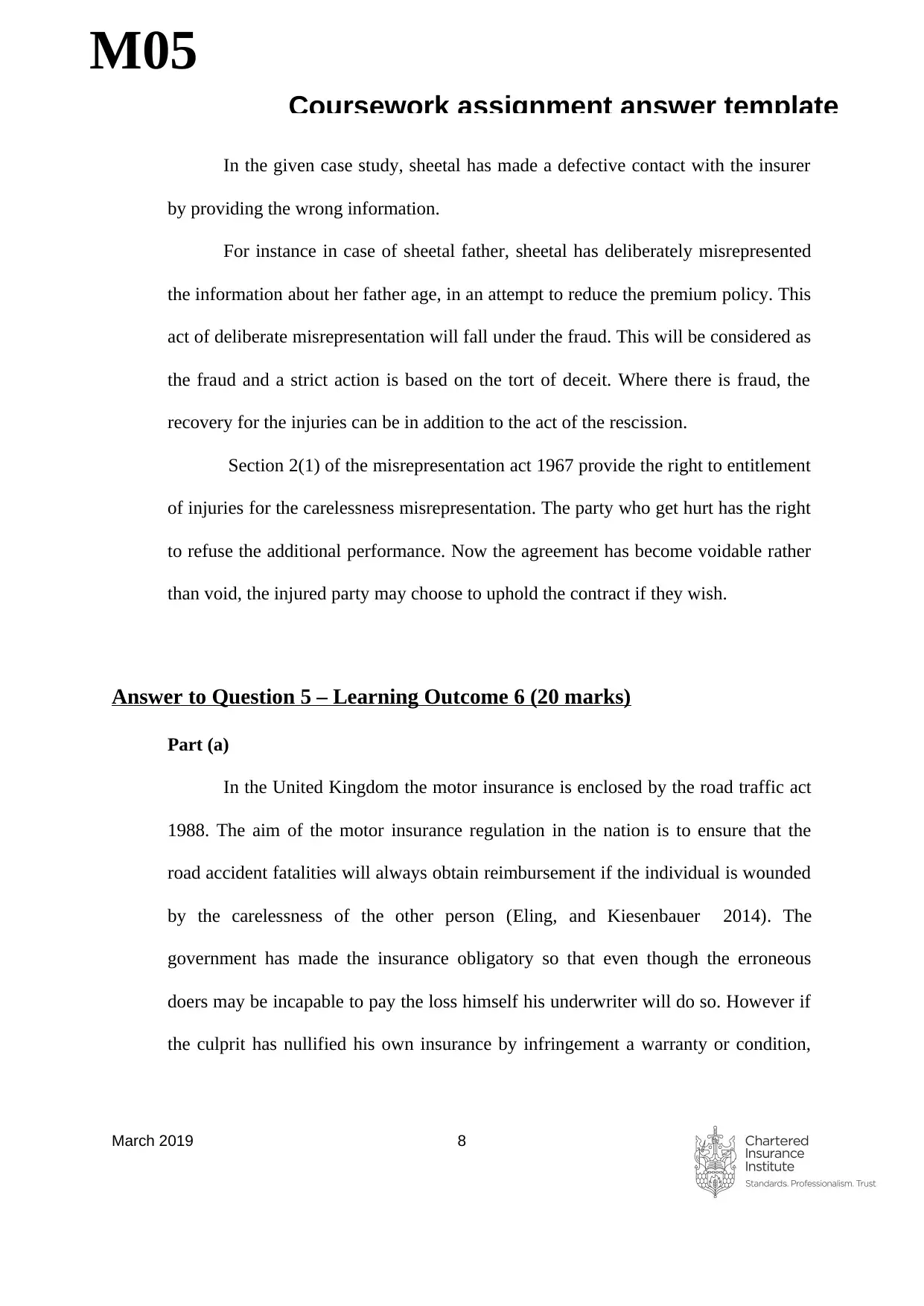
Coursework assignment answer template
M05
wAssiIn the given case study, sheetal has made a defective contact with the insurer
by providing the wrong information.
For instance in case of sheetal father, sheetal has deliberately misrepresented
the information about her father age, in an attempt to reduce the premium policy. This
act of deliberate misrepresentation will fall under the fraud. This will be considered as
the fraud and a strict action is based on the tort of deceit. Where there is fraud, the
recovery for the injuries can be in addition to the act of the rescission.
Section 2(1) of the misrepresentation act 1967 provide the right to entitlement
of injuries for the carelessness misrepresentation. The party who get hurt has the right
to refuse the additional performance. Now the agreement has become voidable rather
than void, the injured party may choose to uphold the contract if they wish.
Answer to Question 5 – Learning Outcome 6 (20 marks)
Part (a)
In the United Kingdom the motor insurance is enclosed by the road traffic act
1988. The aim of the motor insurance regulation in the nation is to ensure that the
road accident fatalities will always obtain reimbursement if the individual is wounded
by the carelessness of the other person (Eling, and Kiesenbauer 2014). The
government has made the insurance obligatory so that even though the erroneous
doers may be incapable to pay the loss himself his underwriter will do so. However if
the culprit has nullified his own insurance by infringement a warranty or condition,
March 2019 8
M05
wAssiIn the given case study, sheetal has made a defective contact with the insurer
by providing the wrong information.
For instance in case of sheetal father, sheetal has deliberately misrepresented
the information about her father age, in an attempt to reduce the premium policy. This
act of deliberate misrepresentation will fall under the fraud. This will be considered as
the fraud and a strict action is based on the tort of deceit. Where there is fraud, the
recovery for the injuries can be in addition to the act of the rescission.
Section 2(1) of the misrepresentation act 1967 provide the right to entitlement
of injuries for the carelessness misrepresentation. The party who get hurt has the right
to refuse the additional performance. Now the agreement has become voidable rather
than void, the injured party may choose to uphold the contract if they wish.
Answer to Question 5 – Learning Outcome 6 (20 marks)
Part (a)
In the United Kingdom the motor insurance is enclosed by the road traffic act
1988. The aim of the motor insurance regulation in the nation is to ensure that the
road accident fatalities will always obtain reimbursement if the individual is wounded
by the carelessness of the other person (Eling, and Kiesenbauer 2014). The
government has made the insurance obligatory so that even though the erroneous
doers may be incapable to pay the loss himself his underwriter will do so. However if
the culprit has nullified his own insurance by infringement a warranty or condition,
March 2019 8
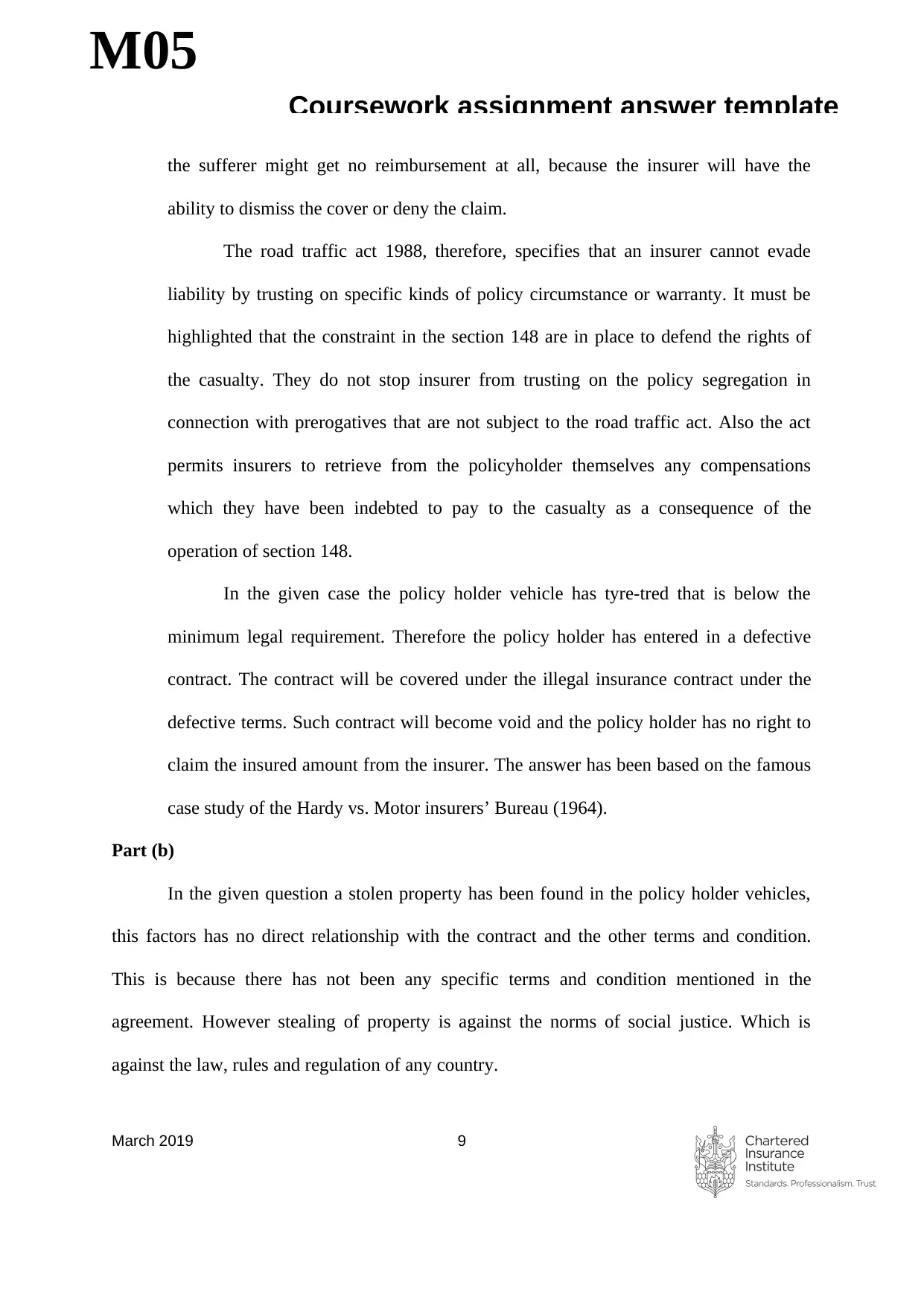
Coursework assignment answer template
M05
wAssithe sufferer might get no reimbursement at all, because the insurer will have the
ability to dismiss the cover or deny the claim.
The road traffic act 1988, therefore, specifies that an insurer cannot evade
liability by trusting on specific kinds of policy circumstance or warranty. It must be
highlighted that the constraint in the section 148 are in place to defend the rights of
the casualty. They do not stop insurer from trusting on the policy segregation in
connection with prerogatives that are not subject to the road traffic act. Also the act
permits insurers to retrieve from the policyholder themselves any compensations
which they have been indebted to pay to the casualty as a consequence of the
operation of section 148.
In the given case the policy holder vehicle has tyre-tred that is below the
minimum legal requirement. Therefore the policy holder has entered in a defective
contract. The contract will be covered under the illegal insurance contract under the
defective terms. Such contract will become void and the policy holder has no right to
claim the insured amount from the insurer. The answer has been based on the famous
case study of the Hardy vs. Motor insurers’ Bureau (1964).
Part (b)
In the given question a stolen property has been found in the policy holder vehicles,
this factors has no direct relationship with the contract and the other terms and condition.
This is because there has not been any specific terms and condition mentioned in the
agreement. However stealing of property is against the norms of social justice. Which is
against the law, rules and regulation of any country.
March 2019 9
M05
wAssithe sufferer might get no reimbursement at all, because the insurer will have the
ability to dismiss the cover or deny the claim.
The road traffic act 1988, therefore, specifies that an insurer cannot evade
liability by trusting on specific kinds of policy circumstance or warranty. It must be
highlighted that the constraint in the section 148 are in place to defend the rights of
the casualty. They do not stop insurer from trusting on the policy segregation in
connection with prerogatives that are not subject to the road traffic act. Also the act
permits insurers to retrieve from the policyholder themselves any compensations
which they have been indebted to pay to the casualty as a consequence of the
operation of section 148.
In the given case the policy holder vehicle has tyre-tred that is below the
minimum legal requirement. Therefore the policy holder has entered in a defective
contract. The contract will be covered under the illegal insurance contract under the
defective terms. Such contract will become void and the policy holder has no right to
claim the insured amount from the insurer. The answer has been based on the famous
case study of the Hardy vs. Motor insurers’ Bureau (1964).
Part (b)
In the given question a stolen property has been found in the policy holder vehicles,
this factors has no direct relationship with the contract and the other terms and condition.
This is because there has not been any specific terms and condition mentioned in the
agreement. However stealing of property is against the norms of social justice. Which is
against the law, rules and regulation of any country.
March 2019 9
⊘ This is a preview!⊘
Do you want full access?
Subscribe today to unlock all pages.

Trusted by 1+ million students worldwide
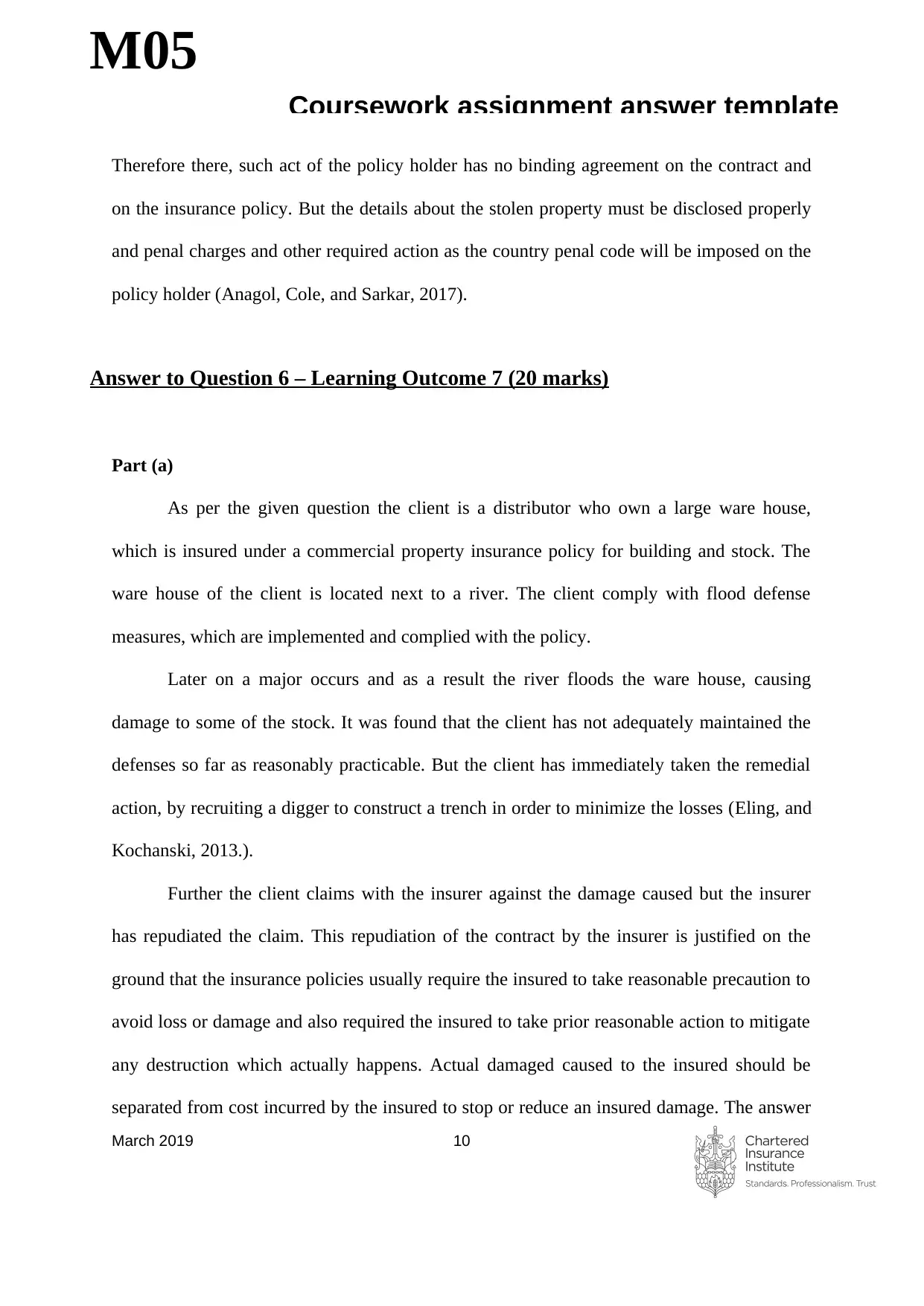
Coursework assignment answer template
M05
wAssiTherefore there, such act of the policy holder has no binding agreement on the contract and
on the insurance policy. But the details about the stolen property must be disclosed properly
and penal charges and other required action as the country penal code will be imposed on the
policy holder (Anagol, Cole, and Sarkar, 2017).
Answer to Question 6 – Learning Outcome 7 (20 marks)
Part (a)
As per the given question the client is a distributor who own a large ware house,
which is insured under a commercial property insurance policy for building and stock. The
ware house of the client is located next to a river. The client comply with flood defense
measures, which are implemented and complied with the policy.
Later on a major occurs and as a result the river floods the ware house, causing
damage to some of the stock. It was found that the client has not adequately maintained the
defenses so far as reasonably practicable. But the client has immediately taken the remedial
action, by recruiting a digger to construct a trench in order to minimize the losses (Eling, and
Kochanski, 2013.).
Further the client claims with the insurer against the damage caused but the insurer
has repudiated the claim. This repudiation of the contract by the insurer is justified on the
ground that the insurance policies usually require the insured to take reasonable precaution to
avoid loss or damage and also required the insured to take prior reasonable action to mitigate
any destruction which actually happens. Actual damaged caused to the insured should be
separated from cost incurred by the insured to stop or reduce an insured damage. The answer
March 2019 10
M05
wAssiTherefore there, such act of the policy holder has no binding agreement on the contract and
on the insurance policy. But the details about the stolen property must be disclosed properly
and penal charges and other required action as the country penal code will be imposed on the
policy holder (Anagol, Cole, and Sarkar, 2017).
Answer to Question 6 – Learning Outcome 7 (20 marks)
Part (a)
As per the given question the client is a distributor who own a large ware house,
which is insured under a commercial property insurance policy for building and stock. The
ware house of the client is located next to a river. The client comply with flood defense
measures, which are implemented and complied with the policy.
Later on a major occurs and as a result the river floods the ware house, causing
damage to some of the stock. It was found that the client has not adequately maintained the
defenses so far as reasonably practicable. But the client has immediately taken the remedial
action, by recruiting a digger to construct a trench in order to minimize the losses (Eling, and
Kochanski, 2013.).
Further the client claims with the insurer against the damage caused but the insurer
has repudiated the claim. This repudiation of the contract by the insurer is justified on the
ground that the insurance policies usually require the insured to take reasonable precaution to
avoid loss or damage and also required the insured to take prior reasonable action to mitigate
any destruction which actually happens. Actual damaged caused to the insured should be
separated from cost incurred by the insured to stop or reduce an insured damage. The answer
March 2019 10
Paraphrase This Document
Need a fresh take? Get an instant paraphrase of this document with our AI Paraphraser
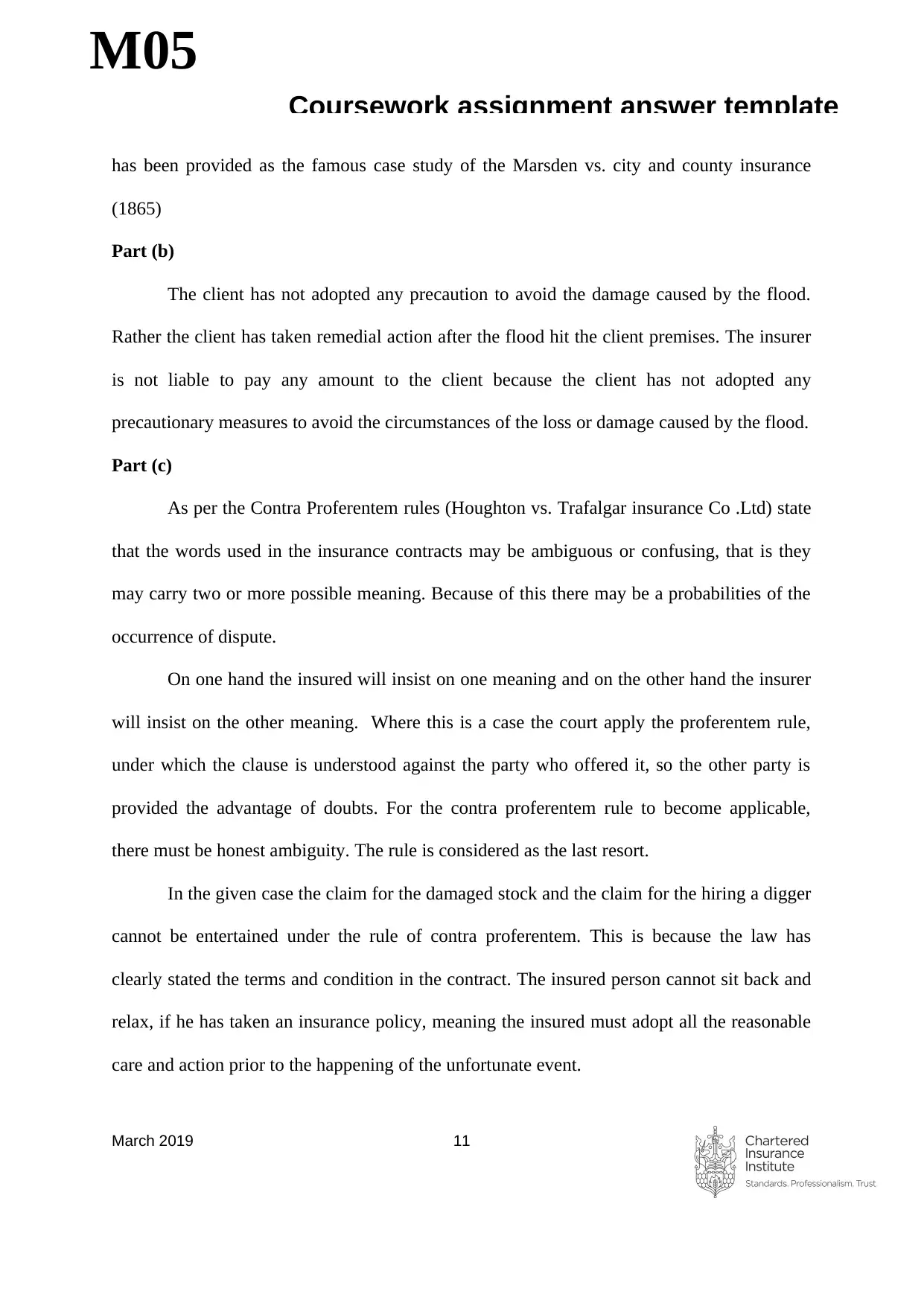
Coursework assignment answer template
M05
wAssihas been provided as the famous case study of the Marsden vs. city and county insurance
(1865)
Part (b)
The client has not adopted any precaution to avoid the damage caused by the flood.
Rather the client has taken remedial action after the flood hit the client premises. The insurer
is not liable to pay any amount to the client because the client has not adopted any
precautionary measures to avoid the circumstances of the loss or damage caused by the flood.
Part (c)
As per the Contra Proferentem rules (Houghton vs. Trafalgar insurance Co .Ltd) state
that the words used in the insurance contracts may be ambiguous or confusing, that is they
may carry two or more possible meaning. Because of this there may be a probabilities of the
occurrence of dispute.
On one hand the insured will insist on one meaning and on the other hand the insurer
will insist on the other meaning. Where this is a case the court apply the proferentem rule,
under which the clause is understood against the party who offered it, so the other party is
provided the advantage of doubts. For the contra proferentem rule to become applicable,
there must be honest ambiguity. The rule is considered as the last resort.
In the given case the claim for the damaged stock and the claim for the hiring a digger
cannot be entertained under the rule of contra proferentem. This is because the law has
clearly stated the terms and condition in the contract. The insured person cannot sit back and
relax, if he has taken an insurance policy, meaning the insured must adopt all the reasonable
care and action prior to the happening of the unfortunate event.
March 2019 11
M05
wAssihas been provided as the famous case study of the Marsden vs. city and county insurance
(1865)
Part (b)
The client has not adopted any precaution to avoid the damage caused by the flood.
Rather the client has taken remedial action after the flood hit the client premises. The insurer
is not liable to pay any amount to the client because the client has not adopted any
precautionary measures to avoid the circumstances of the loss or damage caused by the flood.
Part (c)
As per the Contra Proferentem rules (Houghton vs. Trafalgar insurance Co .Ltd) state
that the words used in the insurance contracts may be ambiguous or confusing, that is they
may carry two or more possible meaning. Because of this there may be a probabilities of the
occurrence of dispute.
On one hand the insured will insist on one meaning and on the other hand the insurer
will insist on the other meaning. Where this is a case the court apply the proferentem rule,
under which the clause is understood against the party who offered it, so the other party is
provided the advantage of doubts. For the contra proferentem rule to become applicable,
there must be honest ambiguity. The rule is considered as the last resort.
In the given case the claim for the damaged stock and the claim for the hiring a digger
cannot be entertained under the rule of contra proferentem. This is because the law has
clearly stated the terms and condition in the contract. The insured person cannot sit back and
relax, if he has taken an insurance policy, meaning the insured must adopt all the reasonable
care and action prior to the happening of the unfortunate event.
March 2019 11
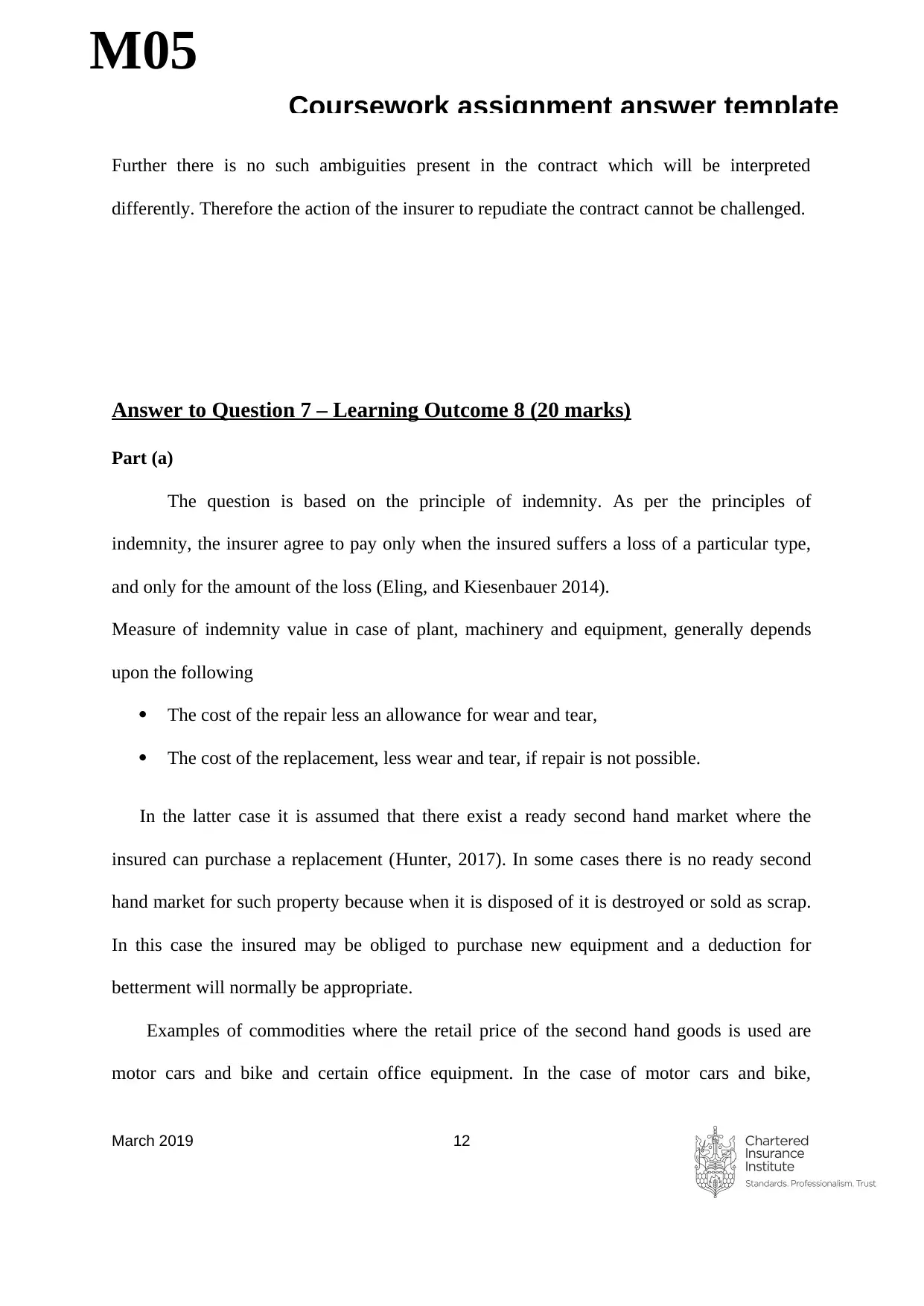
Coursework assignment answer template
M05
wAssiFurther there is no such ambiguities present in the contract which will be interpreted
differently. Therefore the action of the insurer to repudiate the contract cannot be challenged.
Answer to Question 7 – Learning Outcome 8 (20 marks)
Part (a)
The question is based on the principle of indemnity. As per the principles of
indemnity, the insurer agree to pay only when the insured suffers a loss of a particular type,
and only for the amount of the loss (Eling, and Kiesenbauer 2014).
Measure of indemnity value in case of plant, machinery and equipment, generally depends
upon the following
The cost of the repair less an allowance for wear and tear,
The cost of the replacement, less wear and tear, if repair is not possible.
In the latter case it is assumed that there exist a ready second hand market where the
insured can purchase a replacement (Hunter, 2017). In some cases there is no ready second
hand market for such property because when it is disposed of it is destroyed or sold as scrap.
In this case the insured may be obliged to purchase new equipment and a deduction for
betterment will normally be appropriate.
Examples of commodities where the retail price of the second hand goods is used are
motor cars and bike and certain office equipment. In the case of motor cars and bike,
March 2019 12
M05
wAssiFurther there is no such ambiguities present in the contract which will be interpreted
differently. Therefore the action of the insurer to repudiate the contract cannot be challenged.
Answer to Question 7 – Learning Outcome 8 (20 marks)
Part (a)
The question is based on the principle of indemnity. As per the principles of
indemnity, the insurer agree to pay only when the insured suffers a loss of a particular type,
and only for the amount of the loss (Eling, and Kiesenbauer 2014).
Measure of indemnity value in case of plant, machinery and equipment, generally depends
upon the following
The cost of the repair less an allowance for wear and tear,
The cost of the replacement, less wear and tear, if repair is not possible.
In the latter case it is assumed that there exist a ready second hand market where the
insured can purchase a replacement (Hunter, 2017). In some cases there is no ready second
hand market for such property because when it is disposed of it is destroyed or sold as scrap.
In this case the insured may be obliged to purchase new equipment and a deduction for
betterment will normally be appropriate.
Examples of commodities where the retail price of the second hand goods is used are
motor cars and bike and certain office equipment. In the case of motor cars and bike,
March 2019 12
⊘ This is a preview!⊘
Do you want full access?
Subscribe today to unlock all pages.

Trusted by 1+ million students worldwide
1 out of 22
Your All-in-One AI-Powered Toolkit for Academic Success.
+13062052269
info@desklib.com
Available 24*7 on WhatsApp / Email
![[object Object]](/_next/static/media/star-bottom.7253800d.svg)
Unlock your academic potential
Copyright © 2020–2026 A2Z Services. All Rights Reserved. Developed and managed by ZUCOL.
